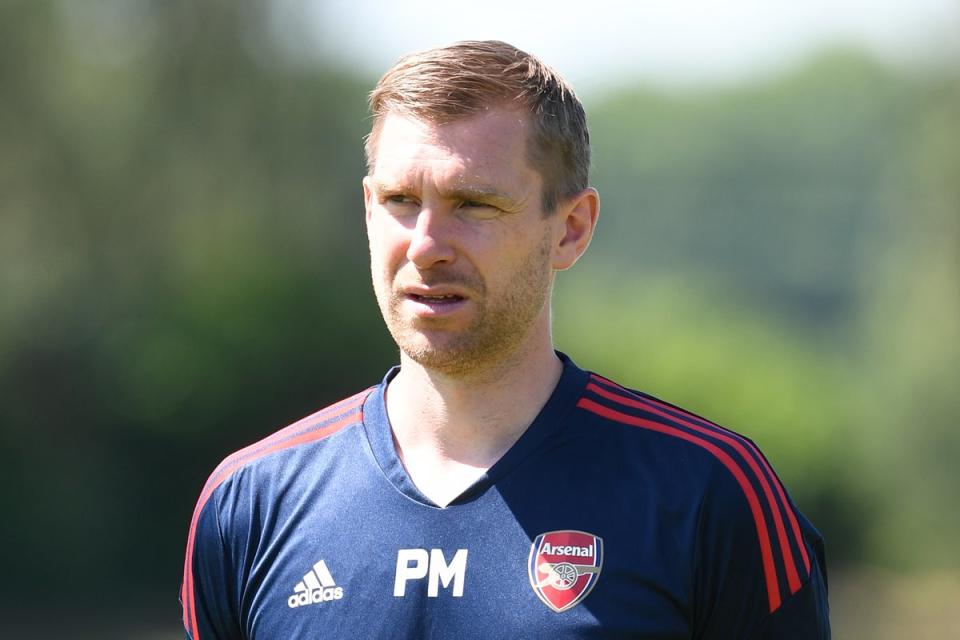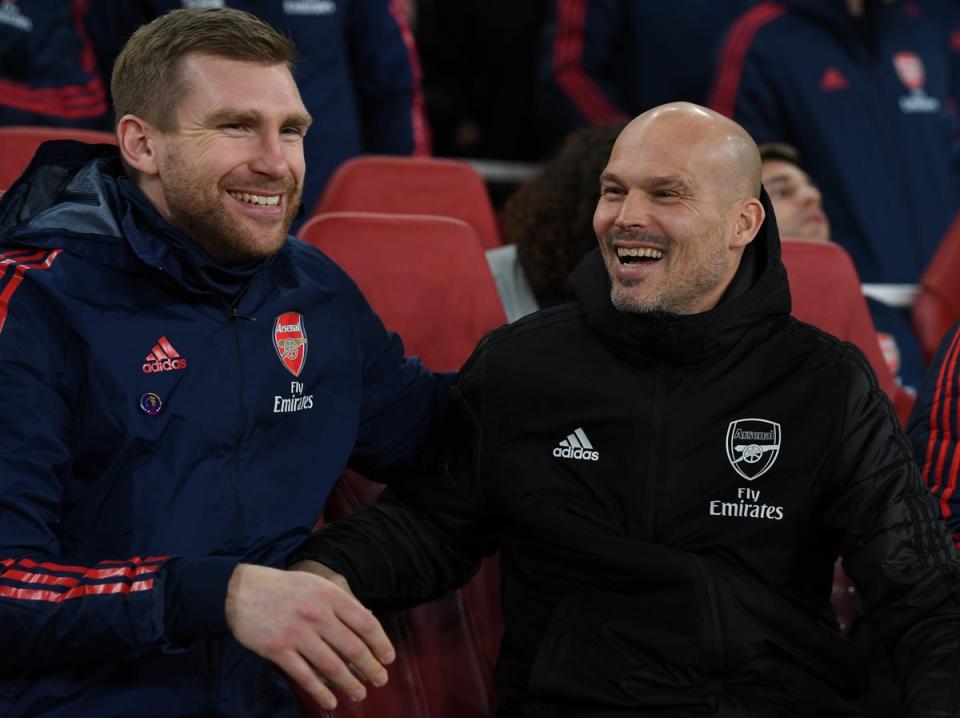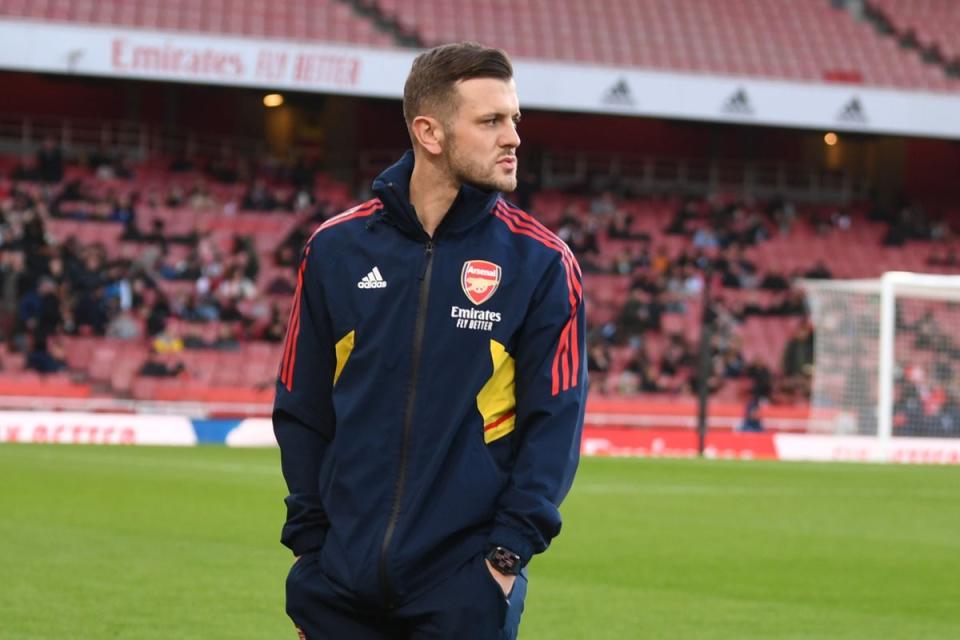Per Mertesacker interview: ‘Mikel Arteta told Arsenal to find me a job... I could only repay the favour’

When Mikel Arteta left Arsenal in 2016, he did so with a note for the club’s chief executive at the time, Ivan Gazidis.
It was not, as one might expect, a prediction by Arteta that he would return to the club in the future and manage them after a stint coaching at Manchester City.
Instead, the Spaniard urged Arsenal to find a role for his team-mate, Per Mertesacker, who would end up retiring in two years’ time.
The advice was clearly taken onboard as in 2018, Mertesacker took over as Arsenal’s academy manager. Five years on, he’s still there and now reunited with Arteta.
“When [Arteta] left us, he left Ivan Gazidis a note saying: ‘You can’t lose this guy’,” says Mertesacker. “[It was] in terms of: you are losing me now, you are asking me too late. Because he had promised to go to City.
“He told Ivan: ‘You can’t lose this guy. Just put him somewhere’. That was kind of the start, and we kept tabs. And then between him and Unai [Emery], that was the situation.
“I put a good word in for him, without knowing how good he was as a coach. I knew how good he was as a human being and how much I trusted him.
“He called me when he didn’t get the job to say: ‘Thank you, I know you put my name forward’. A year and a half after when he then came, and Edu came, it felt like the right time.
“From there it has been a feeling of trust, that we both do the best for the club and it is pretty much aligned.”
During his playing days, Mertesacker was unsure what the future would hold after football but it is clear he feels at home running Arsenal’s academy.
He had a taste of coaching in 2019, working as Freddie Ljungberg’s assistant when Unai Emery had been sacked. Mertesacker filled in as part of the Swede’s backroom team, juggling it with his academy work, and it was a period that only underlined he was in the right job.
“I had the three weeks with Freddie Ljungberg and that was kind of the shock experience of my life, basically,” says Mertesacker.
“When I had to support him, that’s when I felt it was a bit overwhelming, almost coming back to my 15-year playing career - every week something is on the line, every result you have to take. I felt that was not something I wanted to pursue.”

In his role as academy manager, Mertesacker is in charge of 80 to 100 staff and players ranging from Under-9s to Under-21s.
When he first took charge, the German was looking two to three years into the future as he tries to develop Arsenal’s future stars. Six years in the job has taught him that is not the way and instead Mertesacker looks at the academy in a 10-year cycle.
There have been success stories since Mertesacker came in, namely the likes of Bukayo Saka and Emile Smith Rowe breaking into the first-team, but he insists this is only the beginning.
“I’m looking at the next three years thinking, this is when the real work starts,” he says. “Up until now I had to deal with Covid and a change in management. I’m looking at years five-to-seven to see a real impact of the strategy.
“Next year we are in the Champions League. The challenges ask more. How can we get more from our players, make them better for Mikel to be convinced they can play a part in two years’ time?”
Jack wants to coach a first-team, but I’m not letting him at the moment.
Success for the academy this season has manifested itself in the Under-18s reaching the final of the FA Youth Cup, where they will face West Ham in the final at the Emirates Stadium on Tuesday.
They have been led there by Jack Wilshere, who was appointed U18 manager after hanging up his boots in the summer. Mertesacker was the driving force behind hiring Wilshere, who he knew from his playing days, and so far it has proved a shrewd move.
“I was praying that Jack would turn up for the interview and be himself,” says Mertesacker. “So that was a moment when the truth comes.
“It was brilliant to see him presenting himself, what he stands for, what he wants to be like, what coach he wants to be, how he wants to play.
“I don’t regret it whatsoever, putting him in front of the people. He delivered in that moment and he’s delivered in many other moments which have got him to the final.
“His ambition naturally is one day to go somewhere and coach a first-team, but I’m not letting him at the moment. I think it’s important to be ambitious, but I think he respects the process so much more now.”

Wilshere’s hire underlines how Arsenal have a core of former players running through the structure of the club.
Mertesacker believes that is contributing to the success this season, with the senior side top of the Premier League and the women’s team in the semi-finals of the Champions League.
In the German’s eyes, after years of struggle, everything is aligned and now the aim is to eclipse the achievements he had at Arsenal as a player.
“If you just look at footballing success and us being in the squad, we saved a few Champions League seasons, a few FA Cups, that was okay but not outstanding,” notes Mertesacker.
“But we wanted to build something now that maybe is more successful for the future of the club. That is what excites me.
“We couldn’t get it done in terms of league titles when we were here. Hopefully we can be more successful in terms of trophies and major titles and hopefully build up the next generation of players and people who can make the difference on the pitch as well.”
